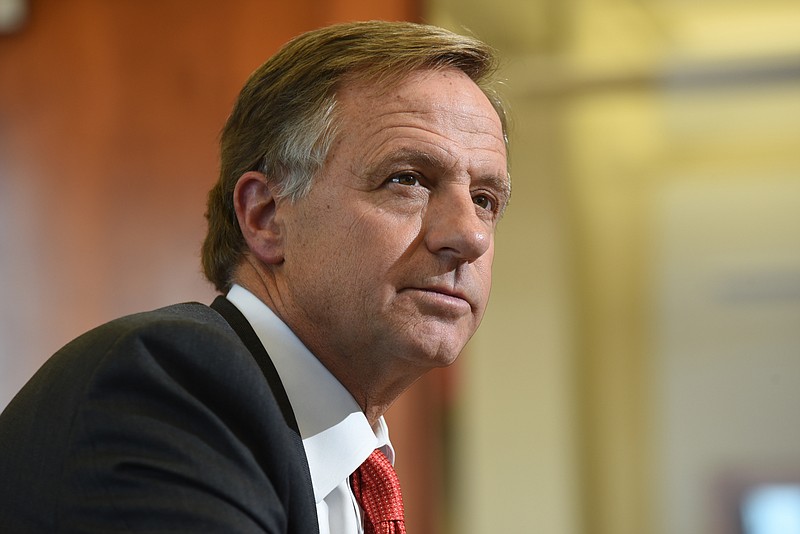COMPARISON BOX
Gas & diesel per-gallon excise and fees for Tennessee and surrounding states:* Tennessee: Gas - 21.4 cents; diesel - 18.4 cents Alabama: Gas - 20.91 cents; diesel - 21.5 cents Arkansas: Gas - 21.5 cents; diesel - 22.8 cents Georgia: Gas - 31.09 cents; diesel - 34.19 cents Kentucky: Gas - 26 cents; diesel - 23 cents Mississippi: Gas - 18.79 cents; diesel - 18.4 cents Missouri: Gas - 17.3 cents; diesel - 17.3 cents North Carolina: Gas - 34.55 cents; diesel - 34.55 cents Virginia: Gas - 22.3 cents; diesel - 26.03 cents * Source: American Petroleum Institute 2017 figures
NASHVILLE - Most Tennessee legislative leaders agree the state should cut some taxes to ease potential public concern about Republican Gov. Bill Haslam's anticipated plan to hike fuel taxes for transportation needs.
But here's the rub: Which ones?
Fuel taxes haven't been raised since 1989 and have lost ground to inflation. But budget analyst are predicting a $1 billion surplus in one-time money from taxes that fund general government needs like health care and K-12 and higher education, and anywhere from $763 million to $878 million in recurring money, above usual growth.
Haslam could unveil his fuel tax proposal either this week or next.
As the 110th General Assembly got underway last week, Republican House Speaker Beth Harwell of Nashville told reporters "this General Assembly does not take raising taxes lightly, so I predict that if we look at increasing the user tax on gas, we will also look at lowering a tax somewhere else."
Tennessee fuel taxes, now pegged at 21.4 cents per gallon tax and 18.4 cents for diesel, were first enacted in 1924 specifically to go toward roads. Some 1.4 cents goes for pump inspections and related environmental issues.
But increased vehicle fuel efficiency has meant relatively flat fuel tax revenue in recent years, while the state's buying power has gone down substantially over the last 27 years. Comptroller Justin Wilson estimates a gas tax valued at 20 cents on the gallon in 1989 was effectively worth just 11 cents in 2013.
Republican leaders are all over the map on what taxes to cut, although all agree any action should be "revenue neutral" in terms of the overall $35 billion budget.
"We've obviously heard that message, too," Haslam told reporters last week, but he added a warning.
"We're obviously in a position right now where we can do a lot of things, but the sun's not always shining as brightly as it is financially in Tennessee than it is right now. So we want to be prudent for the long term in coming with that plan" in corresponding tax reductions elsewhere.
In private meetings with lawmakers, Haslam has discussed increases of 7 to 9 cents in the gas tax and 12 cents on diesel. Lawmakers also registration fees for cars, trucks and motorcycles could to up by $5.
As far as reductions elsewhere, some, like House Finance Committee Chairman Charles Sargent, R-Franklin, advocate cuts in general government taxes, primarily corporate franchise and excise taxes. Some favor accelerating last year's phase-out of the personal Hall income tax on interest and investments.
Others, both Republicans and Democrats, prefer to lower the state's 7 percent sales tax, or at least the 5 percent rate applying to food sales. When added to local levies of up to 2.75 percent, Tennessee has one of the highest sales tax rates in the nation.
And some Republicans are eyeing the $400 "personal privilege" tax on many professionals, including doctors, lawyers and even lobbyists.
New Senate Speaker Randy McNally of Oak Ridge said any fuel tax increase should be kept relatively low and be paired with offsetting reductions elsewhere. He'd consider "finishing out, probably" the state portion of the Hall income tax in one fell swoop and maybe either slowing the phase-out on local governments or leaving their share alone.
Newly appointed House Budget Subcommittee Chairman Gerald McCormick, R-Chattanooga, who will see any gas or diesel tax plan come before his panel, said he still isn't a fan of fuel tax increases.
"I'm not looking to sabotage it or anything like that, but again, I think the burden should fall on the governor to actually propose something that everybody can debate and also have some offsetting tax cuts," said McCormick, a former House majority leader who opposed a fuel tax increase in 2015.
As for cuts, McCormick said, "I would lean towards sales tax so that the poor people can get the tax breaks just as the rich people. It's just my personal opinion. I'm anxious to see what the governor proposes."
Each penny of the state sales tax raises $1 billion.
House Minority Leader Craig Fitzhugh, D-Ripley, said he would like to "see if we can't keep bringing down that food tax."
Each .25 percent on food brings in about $25 million.
Contact Andy Sher at asher@timesfreepress.com or 615-255-0550. Follow on twitter at AndySher1.
